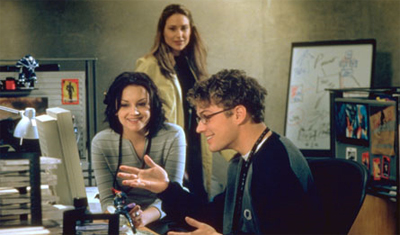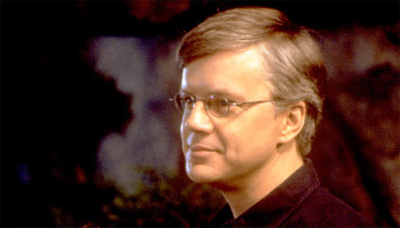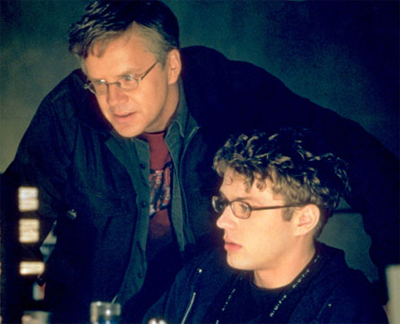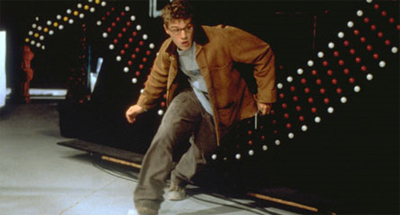In the real world, when you kill people, they die. For real!
– this movie is brought to you by the letter “o” for “open source” (and “obvious”)
You know, I think Microsoft’s PR department deserves a huge round of applause. Sure, they are still pretty universally regarded as a big evil corporation intent on global domination – using controversial business practices in order to stay on top of the computer software food chain. So there’s a lot of hate still out there. And yet, ten years on, it’s remarkable how far we’ve come since AntiTrust was released. There is a lot of hate on show here.
The movie features the fictional company “NURV” and its fictional CEO Gary Winston. I know what’s you’re thinking, he has the reverse initials of one William Gates. That is about as subtle as the movie gets when Tim Robbins steps into the role as an ambitious and arrogant corporate software billionaire. I am genuinely stunned that the producers weren’t sued, so incredible is the likeness between Robbins’ physical appearance and that of Bill Gates. In fact, it seems just a tad unfair, given that the character’s motivational speeches and business drive seem to come from another inspiration – Steve Jobs. Of course, the fact that my mom doesn’t know what Steve Jobs looks like may be why they chose to model Winston on Gates.
Winston espouses an aggressive corporate strategy which makes it clear that his company isn’t aspiring to win some sort of popularity competition. “You’re a one or a zero,” the movie has him repeat again and again and again, “alive or dead.” He also gets great mileage out of the soundbyte, “There is no second place.” The movie might as well have had the character announce to the world that “greed is good!”
The movie has a cult following for the way that it champions the notion of open source software as a desirable business model. The movie does make some good points for that particular argument, repeating the slogan “human knowledge belongs to the world.” It’s a very honest and respectable thought, and one which underscores why the open source movement deserves encouragement and support.
However, the film does allow Gary the chance to justify his own business model. He makes the argument that somebody has to turn a profit (it’s just human nature) and that the wealth earned from this sort of work can be used to fund various philanthropic projects that simply wouldn’t be able to function without the money. It’s an equally valid philosophical point, and there’s nothing necessarily wrong with it.
Where it does become wrong is when that philosophy is enforced through illegal or immoral efforts. Microsoft’s business practices are best outlined by somebody more informed, but – from what I understand – they have skirted the line of legality from time to time (hence the movie’s title). There’s undoubtedly a very smart movie to be made about the type of corporate operations that a market leader like Microsoft finds themselves engaged in, raising valid questions about the morality of their practices. Unfortunately, this is not that movie.
Instead of actually tackling the violations of rights that Microsoft have faced in the past, and playing with their business model, the movie sets up NURV as something of a Microsoft counterpart and then has the company enforce its corporate practices with beating and murders. “NURV kills programmers,” an infomercial message flashes out at us at one point. That’s a decent hook for a thriller, but it seems a bit unfair when you are so dedicated to using your movie to spark debate on an existing company. The movie resorts to portraying the company as something of a grand conspiracy, a nebulous entity that the everybody is working for. One has to wonder, if you stripped away the murder and the hiring of people to spy on employees, would NURV seem so evil? Sure, they’d still be the bad guys, but I suspect the only reason Robbins doesn’t have a twirly moustache to stroke in an evil fashion is because Bill Gates doesn’t either.
It’s interesting to note that the movie seems to treat the same sort of intrusive behaviour by the plucky young protagonists as something to be lauded. When you find a file full of information gathered about your girlfriend and co-workers by your employer without their knowledge or consent, it’s only polite to have a nose through it, after all. The movie sees the hero plant bombs in storage cupboards and hijack every station on the airwaves in an attempt to prove NURV is evil.
Of course, the company has throughly infiltrated every level of government, to the point where there are no official channels left to take – but I’m still not entirely convinced that what the movie cheers on our heroes for doing (including uploading the entire source code of NURV’s platform to the internet before any official investigation proves it was stolen) is any better than the morally ambiguous practices of Microsoft in the real world. Sure, NURV kills people and hires spies to infiltrate the lives of its employees, but, if you remove those facets of the plot and leave behind the thinly-veiled Microsoft stand-in, it’s hard to really believe that what our protagonist does is any better.
It doesn’t help that the movie is populated by a collection of nerd and geek stereotypes. When our lead character explains he has a girlfriend, his work colleague is impressed. “That’s really rare around here,” his colleague replies. Later on, when the same nerd watches our lead try to make a quick escape attempt, he remarks, “What’s with the Mission: Impossible III bullsh!t, man? You’re a geek.” Of course, this is a Hollywood movie, so we’re asked to accept that geeks can look like Ryan Philippe and Rachel Leigh Cook, but let’s continue to play up the stereotype that they are all friendless out-of-shape losers. For a movie which prides itself on being faithful to the way the people programme, it seems a little cheap and cliché.
Of course, it might not be so bad if the young cast was able to handle the material. Philippe would grow into a decent younger performer, and I have a soft spot for Claire Forlani, but the cast really just seem completely lost wandering through the film. Literally the best thing about the movie is Tim Robbins’ completely over-the-top portrayal of Gary Winston. “The guy is a fascist monopolist,” we’re informed early on, and Robbins plays him as such. There is no nuance or depth, just lots of scenery chewing goodness. It might sound bad, but it gives the movie a level of energy that it simply can’t muster without him.
It’s a shame. AntiTrust could have been a great film. There’s definitely material for a movie about the market practices that companies like Microsoft use to crush their competition. Unfortunately, this is not it. Part of the problem is that movie doesn’t have enough faith in its own arguments to make them convincingly, but a larger part is that it treats its audience like morons. When Gary is revealed as a bad guy, we don’t need to hear the words repeated ad infinitum and even have an overlay of another character repeating what he said two minutes ago – we’re not stupid. Perhaps that’s the problem, right there – part of the movie has the lead hacking away inside a kindergarten, but it would do well to remember that we’re not children.
Filed under: Non-Review Reviews | Tagged: AntiTrust, Bill Gates, Claire Forlani, film, films, Google, Microsoft, Movies, non-review review, open source, review, software, Steve Jobs, tim robbins, William Gates |


























Leave a comment